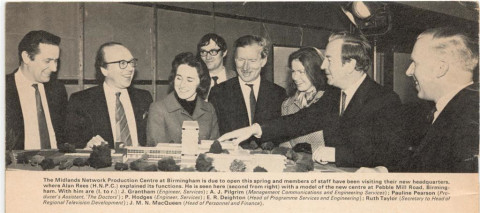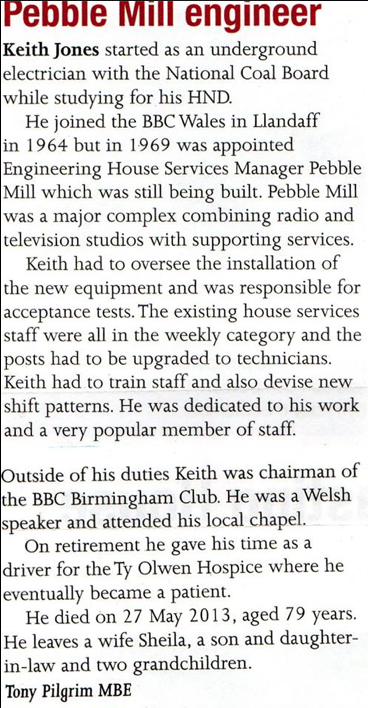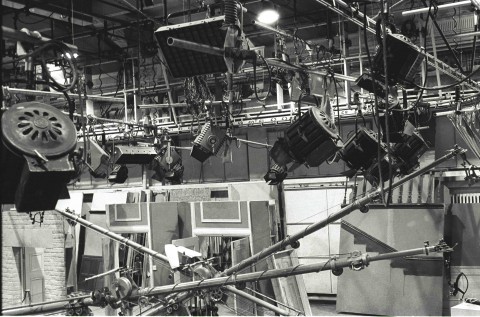The article below was published in the Birmingham Mail on 4th Feb 2015
http://www.birminghammail.co.uk/whats-on/arts-culture-news/champion-birminghams-bbc-pebble-mill-8579283

Copyright resides with the original holder, no reproduction without permission
Tributes have been paid to a former BBC engineer pivotal in bringing the iconic Pebble Mill studios to Birmingham.
Tony Pilgrim, who has died aged 91, was a ferocious critic of the BBC’s move to the Mailbox in 2004, describing it as “one of the worst decisions ever taken by the corporation”.
In a BBC career spanning more than 40 years, he was also responsible for organising outside broadcasts, including one by King George VI from Sandringham in 1945.
Although taking place six years after the events depicted in the Oscar-winning film The Kings Speech, it was for a momentous event – the monarch’s first post-war Christmas Broadcast.
Subsequently Mr Pilgrim took charge of communications facilities at the Wembley Olympic Games in 1948.
But it was the growing trend for moving out to the regions which led to him transferring to Birmingham – marrying actress Ysanne Churchman in 1951 and settling in Edgbaston when she took the part of Grace in radio soap opera The Archers.
At the BBC, he oversaw the construction, building and installation of all technical services in Pebble Mill, the state-of-the-art radio and television headquarters for the Midlands which opened in 1971.
From then until his retirement in 1983 he was a key figure in the provision of technical facilities to support the blossoming programme output in television and radio from the major production centre.
But the BBC move to the Mailbox and demolition of Pebble Mill left Mr Pilgrim angry, and in an interview in 2005 he said: “I remember the excitement we all felt moving into a new, purpose-designed radio and television broadcasting centre, which seemed to be a beacon for the future of broadcasting in the Midlands.
“This beautiful building, which was such a joy to work in, could still have been given a new lease of life for substantially less than the cost of the Mailbox.
“The corporation’s stated objective was to move the BBC into the centre of Birmingham to bring it closer to its public.
“But the Mailbox is on the wrong side of the inner city motorway and remote from the main shopping areas in New Street, Corporation Street and the Bullring.
“If shoppers do find their way there it is a long walk through a shopping mall to the BBC at the rear of the building.”
Speaking of Pebble Mill’s successes, Mr Pilgrim said Phil Sidey’s arrival as head of centre in 1973 led to the launch of the live, lunchtime show Pebble Mill at One which made the building famous across the country.
“He created a wonderful team spirit for all who worked there leading to many great programmes over the years,” he said.
Mr Pilgrim also helped to found the Midland Centre of the Television Society, of which he became chairman in 1964. This led to a seat on the council which in turn led to his chairmanship of the society in 1970.
The society was granted Royal status in 1966 and during his term he opened the very first Cambridge Convention in 1970, which has grown into a high profile bi-annual international event, and served as honorary secretary for 19 years.
In 1987 the RTS celebrated its Diamond Jubilee and Mr Pilgrim organised a reception at the Banqueting House in Whitehall, which was attended by The Queen.
On leaving the BBC, Mr Pilgrim devoted his time to further developing the RTS.
RTS spokeman George Pagan said: “He was forward-looking by nature, seeking to improve and develop everything he was involved in, which brought recognition in many ways including the Gold medal of the Royal Television Society in 1987, and in 1992, the MBE, for services to the Television Industry.”
Mr Pilgrim is survived by Ysanne, after a marriage of 63 years.
The following comment was left on the Pebble Mill Facebook page:
Donald Steel: ‘I’m incredibly sad to hear of Tony’s death. I hadn’t seen him for a couple of years. He was the most terrific company and full of great stories. A wonderful wonderful man.’





